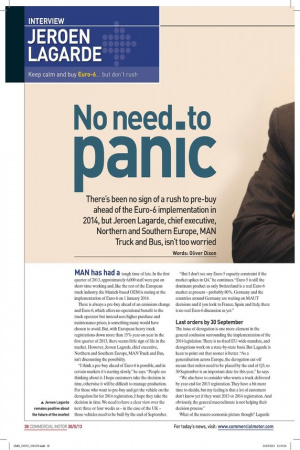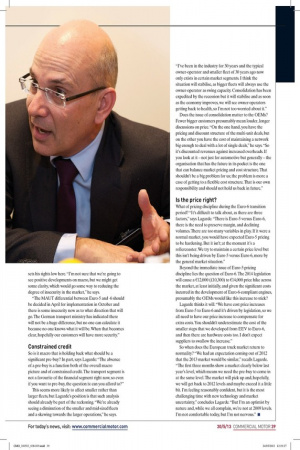Noneed.to Panic There's been no sign of a rush to
Page 29

Page 30

If you've noticed an error in this article please click here to report it so we can fix it.
pre-buy ahead of the Euro-6 implementation in 2014, but Jeroen Lagarde, chief executive, Northern and Southern Europe, MAN Truck and Bus, isn't too worried Words: Oliver Dixon MAN has had a tough time of late. In the first quarter of 2013, approximately 6,000 staff were put on short-time working and, like the rest of the European truck industry, the Munich-based OEM is staring at the implementation of Euro-6 on 1 January 2014.
There is always a pre-buy ahead of an emissions change and Euro-6, which offers no operational benefit to the truck operator but instead sees higher purchase and maintenance prices, is something many would have chosen to avoid. But, with European heavy truck registrations down more than 15% year-on-year in the first quarter of 2013, there seems little sign of life in the market. However, Jeroen Lagarde, chief executive, Northern and Southern Europe, MAN Truck and Bus, isn't discounting the possibility.
"I think a pre-buy ahead of Euro-6 is possible, and in certain markets it's starting slowly," he says. "People are thinking about it. I hope customers take the decision in time, otherwise it will be difficult to manage production. For those who want to pre-buy and get the vehicle on the derogation list for 2014 registration, I hope they take the decision in time. We need to have a clear view over the next three or four weeks as — in the case of the UK — those vehicles need to be built by the end of September. "But I don't see any Euro-5 capacity constraint if the market spikes in 04," he continues. "Euro-5 is still the dominant product as only Switzerland is a real Euro-6 market at present — probably 80%. Germany and the countries around Germany are waiting on MAUT decisions and if you look to France, Spain and Italy, there is no real Euro-6 discussion as yet."
Last orders by 30 September The issue of derogation is one more element in the general confusion surrounding the implementation of the 2014 legislation. There is no fixed EU-wide mandate, and derogations work on a state-by-state basis. But Lagarde is keen to point out that sooner is better. "As a generalisation across Europe, the derogation cut-off means that orders need to be placed by the end of Q3, so 30 September is an important date for this year," he says.
"We also have to consider who wants a truck delivered by year-end for 2013 registration. They have a bit more time to decide, but my feeling is that a lot of customers don't know yet if they want 2013 or 2014 registration. And obviously, the general macroclimate is not helping their decision process."
What of the macro economic picture though? Lagarde sets his sights low here. "I'm not sure that we're going to see positive developments on macro, but we might get some clarity, which would go some way to reducing the degree of insecurity in the market," he says.
"The MAUT differential between Euro-5 and -6 should be decided in April for implementation in October and there is some insecurity now as to what direction that will go. The German transport ministry has indicated there will not be a huge difference, but no one can calculate it because no one knows what it will be. When that becomes clear, hopefully our customers will have more security."
Constrained credit So is it macro that is holding back what should be a significant pre-buy? In part, says Lagarde: "The absence of a pre-buy is a function both of the overall macro picture and of constrained credit. The transport segment is not a favourite of the financial segment right now, so even if you want to pre-buy, the question is: can you afford to?"
This seems more likely to affect smaller rather than larger fleets, but Lagarde's position is that such analysis should already be part of the reckoning. "We're already seeing a diminution of the smaller and mid-sized fleets and a skewing towards the larger operations," he says. "I've been in the industry for 30 years and the typical owner-operator and smaller fleet of 30 years ago now only exists in certain market segments. I think the situation will stabilise, as bigger fleets will always use the owner-operator as swing capacity. Consolidation has been expedited by the recession but it will stabilise and as soon as the economy improves, we will see owner-operators getting back to health, so I'm not too worried about it."
Does the issue of consolidation matter to the OEMs? Fewer bigger customers presumably mean louder, longer discussions on price. "On the one hand, you have the pricing and discount structure of the multi-unit deals, but on the other you have the cost of maintaining a network big enough to deal with a lot of single deals," he says. "So it's discounted revenues against increased overheads. If you look at it — not just for automotive but generally — the organisation that has the future in its pocket is the one that can balance market pricing and cost structure. That shouldn't be a big problem for us; the problem is more a case of getting to a flexible cost structure. That is our own responsibility and should not hold us back in future."
Is the price right?
What of pricing discipline during the Euro-6 transition period? "It's difficult to talk about, as there are three factors," says Lagarde. "There is Euro-5 versus Euro-6, there is the need to preserve margin, and declining volumes. There are too many variables in play. If it were a normal market, you would have expected Euro-5 pricing to be hardening. But it isn't; at the moment it's a rollercoaster. We try to maintain a certain price level but this isn't being driven by Euro-5 versus Euro-6, more by the general market situation."
Beyond the immediate issue of Euro-5 pricing discipline lies the question of Euro-6. The 2014 legislation will cause a €12,000 (£10,300) to €14,000 price hike across the market, at least initially, and given the significant costs incurred in the development of Euro-6-compliant engines, presumably the OEMs would like this increase to stick?
Lagarde thinks it will. "We have cost price increases from Euro-5 to Euro-6 and it's driven by legislation, so we all need to have our price increase to compensate for extra costs. You shouldn't underestimate the cost of the smaller steps that we developed from EEV to Euro-6, and then there are hardware costs too. I don't expect suppliers to swallow the increase."
So when does the European truck market return to normality? "We had an expectation coming out of 2012 that the 2013 market would be similar," recalls Lagarde. "The first three months show a market clearly below last year's level, which means we need the pre-buy to come in at the same level. The market will pick up and, hopefully, we will get back to 2012 levels and maybe exceed it a little bit. I'm feeling reasonably confident, but it is the most challenging time with new technology and market uncertainty," concludes Lagarde. "But I'm an optimist by nature and, while we all complain, we're not at 2009 levels. I'm not comfortable today, but I'm not nervous." •







































